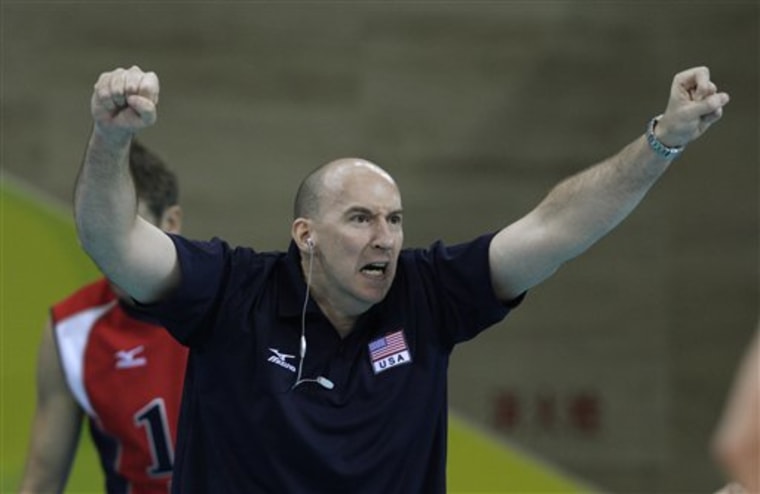Hugh McCutcheon says he doesn’t bring it to the court. He’s built a room in his mind for the grief and the loss and the pain, and when he’s with his team, he locks the door to that room.
But it’s there, just the same. His U.S. men’s volleyball team has inked the initials T.B. and B.B. on their shoes, a constant reminder of what they’re playing for, a reminder of what McCutcheon works so hard at not thinking about.
On Wednesday night in the Capital Gymnasium, McCutcheon and his team got a step closer to what they came here to do. They beat Serbia in five sets and advanced to a semifinal date with Russia. It’s been 16 years since the men’s volleyball team has won a medal of any kind and 20 years since they won the gold.
In Athens, they were in the same position they are in now. They made the medal round but lost their last two matches, finishing fourth and out of the money. So that’s another thing they’re trying not to think about: the quest to finally get back on the medal stand.
It’s hard to tell which one’s harder to ignore, the pressure to win a medal or the grief their coach locks away on game days.
On Wednesday, it was the prospect of reaching the medal round, an eventuality that was threatened early when they lost the first set, victims of their own nervousness at the importance of the game.
“We were a little bit tense,” said Riley Salmon, who spiked the Serbians with a vicious hit at match point and began the night’s celebration. “We had a lot of expectations.”
It’s unavoidable for them. The wonder is how McCutcheon has been able to separate his trauma from the team’s needs, to find the right things to tell them to settle down as well as the right things to tell himself to be able to function.
“All I’m really thinking about is volleyball,” the coach said after the game. “I’m working hard to compartmentalize my life. It’s not about me.”
On Aug. 9, the day after the Opening Ceremony, McCutcheon’s father-in-law and mother-in-law were touring Beijing’s historic Drum Tower when a lunatic with a knife killed Todd Bachman and critically wounded Barbara Bachman. There was nothing special about the murderer, a disaffected and unemployed man who’d decided to leave this life and take somebody with him. The Bachmans just happened to be there when he carried out his mad scheme, punctuating the madness of it by leaping off the tower to his death.
The man wasn’t making a political statement — at least not one that fits into any of the normal compartments.
McCutcheon left the volleyball team to be with his family. His players inked the initials on their shoes and won their first three games. When Barbara Bachman finally came to, she opened her eyes and saw her son-in-law at her bedside.
“Why aren’t you with the team?” she wanted to know. Life, she was telling him, must go on.
McCutcheon returned to the team as his mother-in-law was transported to the Mayo Clinic in Minnesota to continue her recovery. To the three wins they had without him, they’ve added three more. Another two will give them a gold medal.
It can’t have been easy, but no one but McCutcheon can know how hard it’s been. And he’s not talking about it.
Instead, he talked about how he brought his team down Wednesday from the nervous high that threatened to end their Olympics three games too early.
“In the huddle, I told them they were trying to force great plays. I told them to concentrate on making good plays,” he said. “Let’s forget about the goal and concentrate on the process.”
They listened because he always seems to know. Before McCutcheon took over as national coach after the 2004 Games, the team had been coached by Doug Beal, an outstanding analyst and technician. McCutcheon, who was an assistant under Beal, is more of a psychologist.
“He knows how to pull our strings,” veteran team member Lloy Ball said. “He knows how to motivate guys.”
McCutcheon also knows how to get them to focus on what’s important right now, like making those good plays and not panicking when the opponents get a little run going.
They needed that ability Wednesday in the deciding 15-point fifth set. After tying it at 4-4, the Americans watched Serbia rack up three straight points for a 7-4 lead. After a timeout, the Americans tied it before falling behind by two again. They ripped off three points, let the Serbs tie it at 10-10, and then ran away with the game, thanks in large part to the serving of Reid Priddy and Clayton Stanley, two of the best servers in the world.
They came into the Olympics as the third-ranked team in the world. Russia, their next opponent, is ranked second. The top-ranked team, Brazil, is also in the medal round.
So now the mental game begins again. “We’re trying not to think of a medal,” Salmon said. And McCutcheon is trying not to think of his loss.
They are one of the great stories of the game, a human drama and a sports drama wrapped up together, the one indistinguishable from the other. The players want to win for McCutcheon. He wants them to win for themselves and their country.
That’s what he’s thinking about. His wife and his in-laws must spend the game locked in that room in his mind.
"It's just volleyball," McCutcheon said. Then he added: “The other stuff’s the other stuff.” He left after that. There was nothing more to say.
